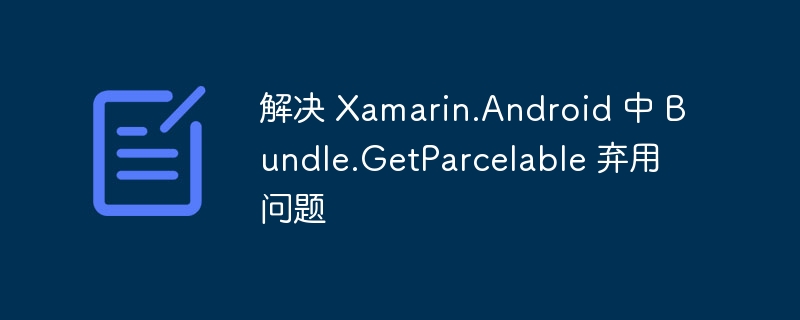Xamarin.AndroidBundle.GetParcelable替代方法
时间:2025-07-06 13:30:26 157浏览 收藏
文章不知道大家是否熟悉?今天我将给大家介绍《Xamarin.Android Bundle.GetParcelable 替代方案》,这篇文章主要会讲到等等知识点,如果你在看完本篇文章后,有更好的建议或者发现哪里有问题,希望大家都能积极评论指出,谢谢!希望我们能一起加油进步!

1. 理解 Bundle.GetParcelable 方法的弃用
在 Android API 33 (Tiramisu) 版本中,android.os.Bundle 类中的 GetParcelable(string key) 方法已被标记为弃用(@Deprecated)。此举是为了提升类型安全性,鼓励开发者使用新的、带类型参数的 GetParcelable(string key, Class
原有的 GetParcelable(string key) 方法返回的是一个通用的 Parcelable 对象,需要开发者手动进行类型转换(如 as User),这在运行时可能导致 ClassCastException 错误,尤其是在类型不匹配时。为了避免此类潜在的运行时错误,Android 平台引入了要求明确指定预期类型的重载方法。
对于 Xamarin.Android 开发者而言,这意味着在使用 Visual Studio 2022 和 Android API 33+ 时,旧的代码会触发弃用警告,即使当前应用在旧版 Android 设备上运行正常,但为了未来的兼容性和代码健康,及时更新是必要的。
2. 原始问题代码示例
假设我们有一个自定义的 User 类,它实现了 Parcelable 接口(在 Xamarin.Android 中通常是 IParcelable),并在 Activity 之间传递其实例。
发送数据(在源 Activity 中):
// 假设 User 类已定义并实现了 IParcelable
public class User : Java.Lang.Object, IParcelable
{
// ... User 类的属性和构造函数 ...
// 实现 Parcelable 接口所需的方法:
// public int DescribeContents() { return 0; }
// public void WriteToParcel(Parcel dest, ParcelFlags flags) { /* ... */ }
// public static readonly IParcelableCreator Creator = new UserCreator();
// internal class UserCreator : Java.Lang.Object, IParcelableCreator { /* ... */ }
}
// 在源 Activity 中准备并发送数据
Intent intent = new Intent(this, typeof(MenuActivity)); // 假设 MenuActivity 是目标 Activity
Bundle bundlee = new Bundle();
User myUser = new User("John Doe", "john@example.com", /* ... 其他参数 ... */);
// 使用 PutParcelable 将 User 对象放入 Bundle
bundlee.PutParcelable("MyUser", myUser);
// 将 Bundle 附加到 Intent
intent.PutExtra("TheBundle", bundlee);
// 启动目标 Activity
StartActivity(intent);接收数据(在目标 Activity 中,旧的弃用方法):
// 在目标 Activity 的 OnCreate 方法中
Bundle bundlee = Intent.GetBundleExtra("TheBundle");
User myUser = new User("", "", /* ... 默认参数 ... */); // 初始化一个默认对象
// 使用旧的 GetParcelable 方法,会收到弃用警告
myUser = bundlee.GetParcelable("MyUser") as User;
// 此时 myUser 包含了从上一个 Activity 传递过来的数据上述接收数据的代码中,bundlee.GetParcelable("MyUser") 会触发弃用警告。
3. 解决方案:使用类型安全的 GetParcelable 方法
新的 GetParcelable 方法签名如下:
@Nullable public <T> T getParcelable(@Nullable String key, @NonNull Class<T> clazz)
其中,clazz 参数要求传入一个 java.lang.Class 对象,它代表了我们期望获取的 Parcelable 对象的类型。在 Xamarin.Android (C#) 环境中,我们需要将 C# 的 System.Type 对象转换为对应的 java.lang.Class 对象。
核心转换方法:Java.Lang.Class.FromType()
Xamarin.Android 提供了 Java.Lang.Class.FromType(System.Type type) 方法,用于将 C# 的 System.Type 对象转换为 Java 的 java.lang.Class 对象。
更新后的接收数据代码示例:
// 在目标 Activity 的 OnCreate 方法中
Bundle bundlee = Intent.GetBundleExtra("TheBundle");
if (bundlee != null)
{
// 方式一:使用 typeof 运算符获取类型信息
// 推荐此方式,因为它在编译时确定类型,更清晰
User myUser = bundlee.GetParcelable("MyUser", Java.Lang.Class.FromType(typeof(User))) as User;
// 方式二:如果已有一个实例,可以使用 GetType() 获取类型信息
// 适用于需要根据现有实例的实际类型来获取的情况,但在此场景下不如 typeof(User) 直观
// User myUser = new User("", "", /* ... 默认参数 ... */); // 如果需要,先初始化
// myUser = bundlee.GetParcelable("MyUser", Java.Lang.Class.FromType(myUser.GetType())) as User;
if (myUser != null)
{
// 成功获取到 User 对象,可以进行后续操作
Console.WriteLine($"Received User: {myUser.Name}, {myUser.Email}");
}
else
{
Console.WriteLine("Failed to retrieve User object or it was null.");
}
}
else
{
Console.WriteLine("Bundle not found in Intent.");
}通过将 typeof(User) 传递给 Java.Lang.Class.FromType(),我们为 GetParcelable 方法提供了它所需的 java.lang.Class 类型信息,从而消除了弃用警告,并提升了代码的类型安全性。
4. 注意事项与最佳实践
- Parcelable 实现完整性: 确保您的自定义类(如 User)正确地实现了 IParcelable 接口及其所有必需的方法(DescribeContents、WriteToParcel 以及 IParcelableCreator)。如果 Parcelable 实现不正确,即使 GetParcelable 调用语法正确,也可能导致运行时错误或数据丢失。
- 空值检查: 在从 Bundle 中获取数据时,始终进行空值检查 (bundlee != null 和 myUser != null),以避免 NullReferenceException。
- API 兼容性: 这种新的 GetParcelable 方法是从 Android API 33 (Tiramisu) 开始引入的。如果您需要支持更低版本的 Android 系统,并且不想引入条件编译,则可能需要考虑其他兼容性策略,例如使用 Java.Lang.Object 并手动转换,或者根据 Build.VERSION.SdkInt 进行条件判断。然而,对于面向 Android 13+ 的新项目,直接采用新方法是最佳实践。
- ClassLoader: 在极少数情况下,如果您的 Parcelable 类不是由应用程序的默认 ClassLoader 加载的(例如,从一个插件或动态加载的 JAR 中),您可能需要在调用 GetParcelable 之前调用 Bundle.SetClassLoader(ClassLoader) 来指定正确的 ClassLoader。但对于大多数标准的应用程序内自定义类,Java.Lang.Class.FromType() 通常能正确处理。
总结
随着 Android API 的不断演进,开发者需要及时更新其代码以适应新的规范和最佳实践。Bundle.GetParcelable(string) 方法的弃用是平台为了提高类型安全性和减少运行时错误所做出的改进。通过采用 Bundle.GetParcelable(string key, Java.Lang.Class clazz) 这一类型安全的方法,并结合 Java.Lang.Class.FromType(typeof(YourType)) 在 Xamarin.Android 中进行类型转换,我们不仅能够消除弃用警告,更能编写出更健壮、更具未来兼容性的应用程序。
理论要掌握,实操不能落!以上关于《Xamarin.AndroidBundle.GetParcelable替代方法》的详细介绍,大家都掌握了吧!如果想要继续提升自己的能力,那么就来关注golang学习网公众号吧!
-
501 收藏
-
501 收藏
-
501 收藏
-
501 收藏
-
501 收藏
-
147 收藏
-
182 收藏
-
253 收藏
-
288 收藏
-
407 收藏
-
498 收藏
-
314 收藏
-
321 收藏
-
286 收藏
-
188 收藏
-
277 收藏
-
331 收藏
-

- 前端进阶之JavaScript设计模式
- 设计模式是开发人员在软件开发过程中面临一般问题时的解决方案,代表了最佳的实践。本课程的主打内容包括JS常见设计模式以及具体应用场景,打造一站式知识长龙服务,适合有JS基础的同学学习。
- 立即学习 543次学习
-

- GO语言核心编程课程
- 本课程采用真实案例,全面具体可落地,从理论到实践,一步一步将GO核心编程技术、编程思想、底层实现融会贯通,使学习者贴近时代脉搏,做IT互联网时代的弄潮儿。
- 立即学习 516次学习
-

- 简单聊聊mysql8与网络通信
- 如有问题加微信:Le-studyg;在课程中,我们将首先介绍MySQL8的新特性,包括性能优化、安全增强、新数据类型等,帮助学生快速熟悉MySQL8的最新功能。接着,我们将深入解析MySQL的网络通信机制,包括协议、连接管理、数据传输等,让
- 立即学习 500次学习
-

- JavaScript正则表达式基础与实战
- 在任何一门编程语言中,正则表达式,都是一项重要的知识,它提供了高效的字符串匹配与捕获机制,可以极大的简化程序设计。
- 立即学习 487次学习
-

- 从零制作响应式网站—Grid布局
- 本系列教程将展示从零制作一个假想的网络科技公司官网,分为导航,轮播,关于我们,成功案例,服务流程,团队介绍,数据部分,公司动态,底部信息等内容区块。网站整体采用CSSGrid布局,支持响应式,有流畅过渡和展现动画。
- 立即学习 485次学习

